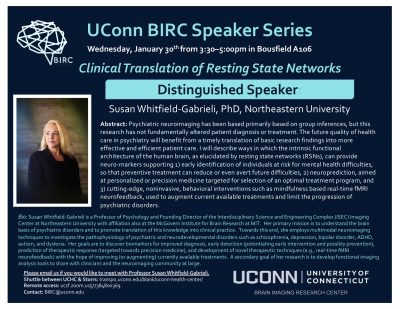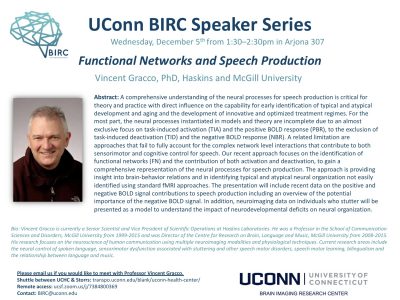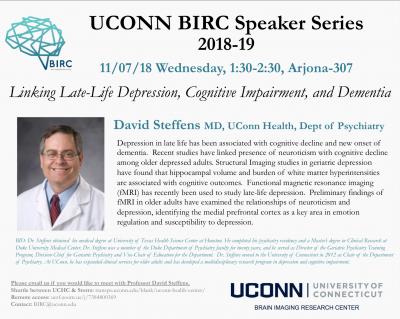Northeastern University and MIT
Distinguished Speaker
Wednesday, January 30 2019 3:30-5:00PM Bousfield A106
Abstract: Psychiatric neuroimaging has been based primarily on group inferences, but this research has not fundamentally altered patient diagnosis or treatment. The future quality of healthcare in psychiatry will benefit from a timely translation of basic research findings into more effective and efficient patient care. I will describe ways in which the intrinsic functional architecture of the human brain, as elucidated by resting state networks (RSNs), can provide neuro-markers supporting 1) early identification of individuals at risk for mental health difficulties, so that perventive treatment can reduce or even avert future difficulties, 2) neuroprediction, aimed at personalized or precision medicine targeted for selection of an optimal treatment program, and 3) cutting-edge, noninvasive, behavioral interventions such as mindfulness based real-time fMRI neurofeedback, used to augment current available treatments and limit the progression of psychiatric disorders.
Bio: Susan Whitfield-Gabrieli is a Professor of Psychology and Founding Director of the Interdisciplinary Science and Engineering Complex (ISEC) Imaging Center at Northeastern University with affiliation also at the McGovern Institute for Brain Research at MIT. Her primary mission is to understand the brain basis of psychiatric disorders and to promote the translation of this knowledge into clinical practice. Towards this end, she employs multimodal neuroimaging techniques to investigate the pathophysiology of psychiatric and neurodevelopmental disorders such as schizophrenia, depression, bipolar disorder, ADHD, autism, and dyslexia. Her goals are to discover biomarkers for improved diagnosis, early detection (potentiating early intervention and possibly prevention), prediction of the therapeutic response (targeted towards precision medicine), and development of novel therapeutic techniques (e.g., real-time fMRI neurofeedback) with the hope of improving (or augmenting) currently available treatments. A secondary goal of her research is to develop functional imaging analysis tools to share with clinicians and the neuroimaging community at large.
Visitors from UCHC are encouraged to use the UCHC-Storrs shuttle service. Talks can also be joined remotely. Please contact us if you are interested in meeting with the speaker.


